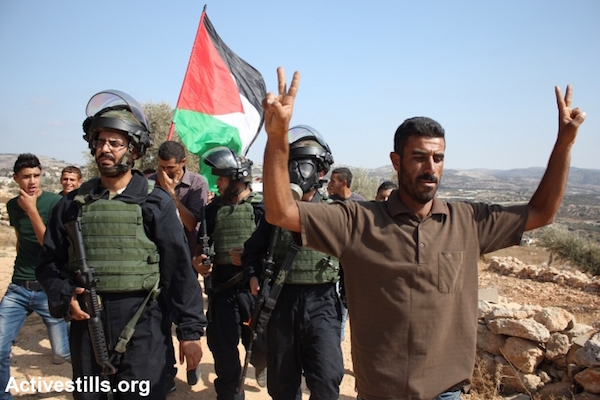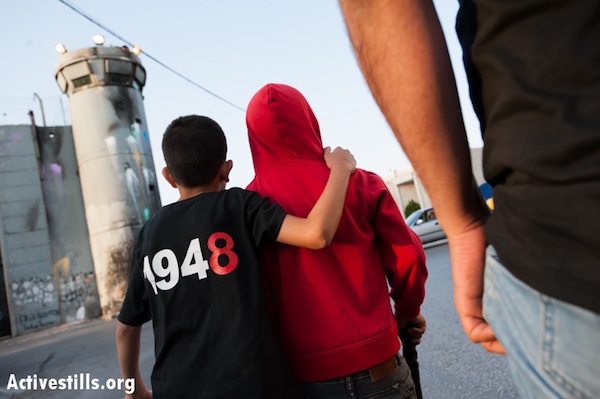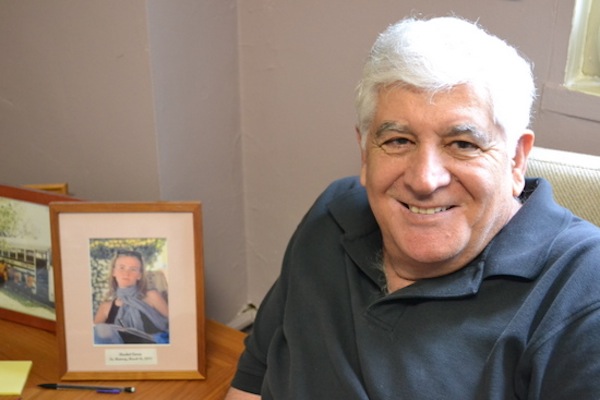At the end of 2000, as the Second Intifada was beginning to spread throughout the West Bank and Gaza, Israeli Professor Meir Amor sat down to speak with Dr. Mubarak Awad, a Palestinian expert on nonviolent resistance. Fifteen years later, the two met once again to talk about nonviolence, growing religious fundamentalism, gender equality, Palestinian refugees and Jews from Arab countries. This interview will be published in Peace Magazine in January 2015.
By Meir Amor
* * *
Meir Amor: About 15 years ago you and I had a discussion published in Peace Magazine. The editors think it’s a good opportunity to have another one. So let me ask you: Does your approach to nonviolence have a religious basis? Do Jewish or Muslim religious authorities consider it compatible with their teachings?
Mubarak Awad: Personally, I do it from a Christian perspective. For me, it’s time for us all to learn not to kill or destroy. But I did not push that belief on any Israelis or any Muslims. However, I did study Islam and nonviolence a lot, and I thought it would be great to have a Muslim who was interested in nonviolence so we could have a strong campaign. At that time I was interested in a fellow by the name of Faisal Husseini, a great Muslim who believed in nonviolence. I bought a lot of books about a Muslim who had been with Gandhi—Abdul Ghaffer Khan, who said that Islam is a nonviolent religion.
I did this because the majority of Palestinians are Muslim. We held conferences studying Islam and nonviolence, discussing what jihad really means and Sufism in Islam. Sufis are like the Quakers in Christianity. There are many Sufis in Islam who accept the challenge of nonviolence. It’s a big struggle for them—not only between the Palestinians and Israelis or Arabs and Israelis, but also between themselves, for them to be nonviolent at home and active in nonviolence in their community. They can see that we human beings have brains, not just guns, and can resolve any conflict, however big, by debating, by forgiveness, by conciliation.
But in the past 20 years the world has moved toward radical religion in Islam, Christianity, and Judaism. That has allowed a minority within each religion to begin dictating what religion means in a fundamentalist way. Many Muslims want to go back to a caliphate or to Mohammed. Some of them want to be more fundamentalist or more conservative.
Amor: Does conservative also means opposing nonviolence?
Awad: Yes. Being radical, insisting that Islam has to be exactly like the time of Mohammed, discriminating against women and against others who don’t believe in their tradition. They see killing as an honor instead of using an ethical or secular way of discussing issues within civil society.
Amor: Nonviolence runs into trouble, not only with the religious authorities, but with existing political institutions. In Israel I’ve been advocating refusal to serve in the occupied territories, but it is only a tiny group of people who actually do that. And within the Palestinian community too, there is political opposition to nonviolence.
Awad: Yes. To be fair to the Palestinians, nonviolent activities have increased over the past 20 years, especially regarding the separation wall. Nearly every Friday a group comes—Israelis, Palestinians, and internationals. They come and protest about the wall. But this nonviolence is by individuals. We don’t see thousands or millions of people coming together for it. We haven’t recognized the strength of nonviolence by a majority of the people who are willing to sacrifice.
Amor: Why is that? Why is it hard for Palestinians and Israelis to accept the option of nonviolence?
Awad: Because they don’t see it as a way of life, or think that the government will listen to them and make changes. Both the Israeli and Palestinian governments are stuck in their way of thinking. Both of them think it is “not the right time” for it. And they both think nonviolence is a weakness.
Amor: When it comes to individuals, it seems that your approach to nonviolence is based on cooperation between “enemies”—that nonviolence requires a courageous, humanistic approach to cooperation across the lines, not only within your group.
Awad: Right. Look at what has happened. The Soviet Union is gone—nonviolently. We had the problem with South Africa; it’s gone—nonviolently. We had the Berlin Wall. It’s gone—nonviolently. We had the Catholic and Protestant fights in Northern Ireland. It’s gone—nonviolently. We had the civil rights movement against segregation in the United States. There are still difficulties in it but it’s gone. We have equal rights. So with any conflict, a time will come for it to solve itself. The question is how we can push it to solve itself without a lot of killing in the meantime. To have less people killed, fewer refugees, widows, and orphans.
Amor: But it is hard to transform a person from perceiving another as an enemy into perceiving him as cooperative. How do you do this?
Awad: A big example of that transformation is in Israel. Anybody who goes to Haifa can see that the Israelis and Palestinians live together with each other. They have Palestinian and Israeli policemen, judges, schools, everything. It’s a small area but it works. Unfortunately, it cannot work in Jerusalem because each religion there says: “God is on our side. God is ours, not theirs, and we have to ask our God to destroy them.” In Haifa they don’t have that notion, so it can happen.
Amor: I agree. I taught for two years at Haifa. I used to write in journals that Haifa University is the most Israeli-Palestinian university you can find. Half of my students were Palestinian (Israelis) and we had to understand the sensitivities.
AWAD: I gave two lectures at Haifa University and they were full of students. I was impressed with them. They did not ask the weird questions that we often hear from both sides. They think in a positive way about how to live together. It was a great experience for me.
AMOR: You have written that “nonviolence is non-acceptance of the authority of the subjugator.” You said that there is a need to overcome the fear of the subjugator. How do you teach political courage?
AWAD: I have recently been speaking with the leadership of Hamas about why Hamas has refused nonviolence. It has to do with ethics, with human rights, and how they could approach the international community. For example, a Palestinian went to a synagogue in Jerusalem just a few weeks ago and killed five people. It would be good for Hamas to say, “We will not accept that.” That would help Hamas’s image with the international, Jewish, and Arab communities. Say that they are not interested in this killing—that there are other ways of dealing with problems.

Amor: Did they accept your opinion?
Awad: Yes. And at one point more than 75 percent of the Israelis accepted a two-state solution. Now I don’t know whether it even reaches 20 percent. At one time they were in the streets asking for peace. Now it is much less acceptable to ask the Palestinians for peace—to the point that it would be to the interest of the peace process to have a nonviolence center in Tel Aviv run by Israelis. The education would have to do with the Jewish concept of nonviolence. It would have nothing to do with religion, but rather with Israeli ways of accepting peace, because people are only getting the army’s perspective.
Amor: The war is managed by men. How does your nonviolent approach relate to gender issues? Do women find it easier to practice nonviolence?
Awad: It’s partly about equality. Men hide behind religion to oppress women. As long as we don’t have gender equality in the Knesset or Palestinian parliament, men will still dominate the whole arena. Even a democracy such as the United States is not fully democratic when there is not equality in the Senate and the House of Representetives between men and women.
Amor: I want to ask how you’d solve the refugee problem. That’s the heart of the problem between Israeli Jews and Palestinians.
Awad: I don’t see it as much of a problem if you accept the two-state solution. Those Palestinians who lived in Palestine are welcome to come back. Those who want to stay where they are outside of Palestine, they should have the right to citizenship in any country where they are. They have to make that choice themselves. The Palestinians in Syria, Iraq, and other places where there is war – they need a place to call home. For them it has become a sacred question. That can be handled very well.
There is no way that Palestinians in the West Bank or in Gaza could destroy Israel—“push Israel into the sea.” Israel has all the power. They can move the United States in whatever direction they want, so Israel’s fear of us is not realistic. Don’t view the acceptance of refugees as a sign weakness; view it as just something that will be accepted by Israelis and Palestinians alike.
Somebody will have to pay them and there is a lot of money around to pay for houses or to move settlers. The refugees could go live there. But in Jordan I don’t think more than 20 percent—maybe only five percent—of the refugees want to go to the West Bank or Gaza.
Amor: I say to my Israeli friends that we should address the refugees not as a threat but as a hope.
Awad: Yes, that’s a positive approach. If those people are welcomed, they will not fight against the people who welcome them.
Amor: You know there is a debate about the one-state or two-state solution, but it seems that the nonviolent approach is not only a peaceful and feminist approach but also suggests that if there is a state at all. We have to share the place.
Awad: Yes, those people who were there in 1948, or who faced difficulty (like myself, after my father was killed when I was five years old), they are Palestinians. How can you make them feel at ease with their environment and with their neighbors? When I feel at ease and know that nobody is going to harm me, I can easily stretch out my hand out to an Israeli. That is no problem. But he has to accept my hand. And if both accept it then we have to show that people can eat together, that what we both need is for our children and grandchildren to have a good society. Let’s work on it.
Amor: You mention South Africa. Some people there, like Desmond Tutu and Mandela recommended ways of forgiveness and sharing. However it seems that they did not actually do so much sharing, although they made significant efforts. Are elements of sharing necessary for achieving forgiveness and reconciliation?

Awad: Yes. It takes leadership to accept that challenge. Tutu is excellent in dealing with reconciliation. He’s a teacher. We have lots of Jews who have been helping in South Africa. They can help the Palestinians and Israelis. But peace will not happen all at once. In South Africa and the United States there are still problems.
Amor: Mainly on the issue of redistribution of resources.
Awad: Right. But nonviolence is mostly a spiritual attitude.
Amor: The late Professor Edward Said, in his book on the Palestinian question, cited Hannah Arendt on how the Jewish refugee issue was solved at the expense of creating refugees on the Palestinian side. In other places she writes about the inability of most people to deal with cohabitation. Your approach of nonviolence is infused with this notion of accepting cohabitation.
Awad: This is related to segregation in our education. Men and women are educated separately, Palestinians and Israelis are educated separately. We have no sports together, no activities together. I have a friend, Eddie Kaufman, who is a Zionist who comes to teach here [in Washington DC]. He wants peace. When we bring his grandchildren and my grandchildren together, they play together and he says, “Look, they don’t understand that in a few years they will want to kill each other.” We put hatred in their minds.
Amor: About 50 percent of the Israeli Jewish population are Jews from Arab countries. Many of them became refugees as a result of the creation of the Jewish state and the conflict. And, in a strange twist, many of these people are seen as right-wingers, entrenched in opposing Palestinians. Tell me about the Palestinian approach to the issue of Jews who were moved out of Arab countries by Arab regimes—which in fact cooperated with the Israeli project of evacuating Jews who had lived in peace with Arabs for centuries. This complemented the Jewish project of pushing Arabs from Palestine instead of accepting their cohabitation. How do you view the dominance of Jews of European descent in Israel and the subordination, not only of Palestinians, but also of Jews who came from Arab countries?
Awad: It is to the advantage of Arab countries to have Jews as neighbors and business people in their countries. They know then that there’s nothing imaginary about Jews. Here they are—human beings just like us. People have to know each other, shake hands, do business with each other. It would be to the advantage of those Arab countries to bring back more Jews. I was discussing this with Jewish groups in Morocco. They are Moroccan. They are happy there; they don’t feel discriminated against because of their religion. That’s fair. A fellow can run for a position in the government. If he is qualified, why not?
Israel is making communication difficult between Palestinians and Israelis by building that wall, by not allowing Israelis to go to Bethlehem, Ramallah, or Gaza. Then it becomes, “Those people over there are hiding. They are devils.” That’s the danger—the danger of not knowing. In a village where the people are all of the same religion, whoever comes to visit is a stranger.
Amor: Recently there was an initiative in the Israeli government to rescind the status of Arabic as a formal language of the state, though the mother tongue of many Jews is Arabic. Politicians build walls but life builds bridges.
Awad: We have to continue supporting Israeli and Palestinian people to get together to push hard against unjust laws. The people can do it.
Dr. Mubarak Awad is a Palestinian psychologist who founded the Palestinian Center for the Study of Nonviolence in 1983, teaching methods of resisting the Israeli occupation. For this he was deported to the United States, where he teaches at American University.
Meir Amor is a sociology professor of Israeli-Moroccan background teaching at Concordia University in Montreal. The interview will be published in Peace Magazine in January 2015.
Related:
Palestinian non-violent activists: Army violence won’t stop our resistance
Israel increases pressure on nonviolent struggle’s flagship village



